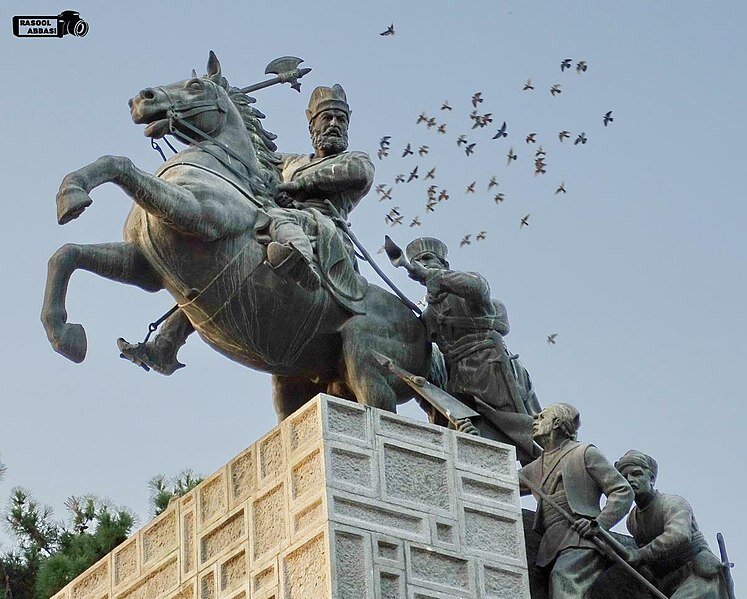The Statue of Nader Shah, known as Napoleon of Persia, undergoes restoration

TEHRAN – The equestrian statue of Nader Shah Afshar, sometimes referred to as the Napoleon of Persia, in his mausoleum in Mashhad, Khorasan Razavi province, has undergone some rehabilitation works, the director of the mausoleum has said.
In this phase of the project, a special electrode has been used to weld some cracks on the statue, and then experienced restorers will clean the statue’s body, Hossein Asghari Sani explained on Monday.
The project is being carried out in collaboration with the Research Institute of Cultural Heritage and Tourism under the supervision of cultural heritage experts, he added.
One of the masterpieces of veteran Iranian Sculptor Fereydoun Sediqi, the statue is one of the biggest of its kind in the country and depicts the monarch holding an ax, while riding a horse, he mentioned.
Nader Shah (August 1688– 19 June 1747) is considered a national hero as he reformed Iran’s military forces and utterly defeated Afghans in a series of brilliant victories, after which he restored Tahmasp to the Iranian throne.
Born Nader Qoli Beg, Nader created an Iranian empire that stretched from the Indus River to the Caucasus Mountains. He is widely considered one of the most powerful rulers in the history of the nation. He assumed power when a period of chaos overwhelmed Iran.
Modern travelers to Mashhad, northeast Iran, may visit Nader’s equestrian statue, which crowns his otherwise dour grey-granite mausoleum. Moreover, there is a small museum displaying guns, a rhino-hide shield, and a carpet portrait of Nader on horseback.
The museum showcases various objects from the introduction of the Afsharay period such as weapons, rare paintings, scenes of war, horseback riding objects, rare swords, and several manuscripts, to name a few. Moreover, it displays a variety of coins, dishes, and other objects from the Safavid to the contemporary period.
Nader endeavored to reunite the Persian realm while repelling invaders. He is sometimes referred to as the Napoleon of Persia or the Second Alexander.
According to Encyclopedia Britannica, Nader Qoli Beg had an obscure beginning in the Turkish Afshar tribe, which was loyal to the Safavid shahs of Iran. After serving under a local chieftain, Nader formed and led a band of robbers, showing marked powers of leadership.
With the navy he proceeded to build, Nader Shah was able not only to take Bahrain from the Arabs but also to invade and conquer Oman. In February 1739, after capturing several cities of the Mughal Empire of northern India, he moved against the main Mughal armies at Karnal, India. He won the battle and entered Delhi, returning to Iran with vast amounts of loot, including the fabulous Peacock Throne and the Koh-e-Noor Diamond. He then attacked the Uzbeks around the cities of Bukhara and Khiva; his empire had reached its furthest expansion and rivaled the territorial extent of the ancient Iranian empires.
In 1741, after an assassination attempt on him had failed, Nader Shah suspected his eldest son of complicity and had him blinded. In 1743, Nader Shah again attacked the Ottoman Turks, but revolts in Iran forced him to conclude a truce. He renewed hostilities with the Turks as soon as possible, winning a great victory over them near Yerevan. Peace was concluded in 1746.
Although brilliantly successful as a soldier and general, Nader Shah had little talent for statesmanship or administration, and Iran became utterly exhausted during the later years of his reign.
Tens of thousands of people perished in his ceaseless military campaigns, and the exactions of his tax gatherers ruined the country’s economy. Nader Shah had always been harsh and ruthless, but these traits became more pronounced as he grew older. His suspiciousness and capricious cruelty continued to grow, and wherever he went, he had people tortured and executed. The consequence was that revolt after revolt against him occurred. In the end, he was assassinated by his own troops while attempting to crush an uprising in Khorasan.
ABU/AM
Leave a Comment